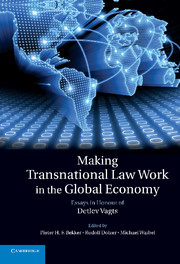Book contents
- Frontmatter
- Contents
- List of contributors
- Foreword: the transnationalism of Detlev Vagts
- List of cases cited
- List of abbreviations and acronyms
- Introduction: a Festschrift to celebrate Detlev Vagts' contributions to transnational law
- 1 Detlev Vagts and the Harvard Law School
- 2 Constructing and developing transnational law: the contribution of Detlev Vagts
- I International law in general
- II Transnational economic law
- 14 Sovereignty-plus in the era of interdependence: toward an international convention on combating human rights violations by Transnational Corporations
- 15 The noisy secrecy: Swiss banking law in international dispute
- 16 Not-for-profit organisations, conflicts of laws and the right of establishment under the EC Treaty
- 17 The meaning of ‘investment’ in the ICSID Convention
- 18 Toward a proper perspective of the private company's distinctiveness
- 19 Administrative law and international law: the encounter of an odd couple
- 20 Making transnational law work through regime-building: the case of international investment law
- 21 Creditor protection in international law
- 22 Stability, integration and political modalities: some American reflections on the European project after the financial crisis
- III Transnational lawyering and dispute resolution
- Bibliography of Detlev Vagts
- Index
20 - Making transnational law work through regime-building: the case of international investment law
from II - Transnational economic law
Published online by Cambridge University Press: 17 November 2010
- Frontmatter
- Contents
- List of contributors
- Foreword: the transnationalism of Detlev Vagts
- List of cases cited
- List of abbreviations and acronyms
- Introduction: a Festschrift to celebrate Detlev Vagts' contributions to transnational law
- 1 Detlev Vagts and the Harvard Law School
- 2 Constructing and developing transnational law: the contribution of Detlev Vagts
- I International law in general
- II Transnational economic law
- 14 Sovereignty-plus in the era of interdependence: toward an international convention on combating human rights violations by Transnational Corporations
- 15 The noisy secrecy: Swiss banking law in international dispute
- 16 Not-for-profit organisations, conflicts of laws and the right of establishment under the EC Treaty
- 17 The meaning of ‘investment’ in the ICSID Convention
- 18 Toward a proper perspective of the private company's distinctiveness
- 19 Administrative law and international law: the encounter of an odd couple
- 20 Making transnational law work through regime-building: the case of international investment law
- 21 Creditor protection in international law
- 22 Stability, integration and political modalities: some American reflections on the European project after the financial crisis
- III Transnational lawyering and dispute resolution
- Bibliography of Detlev Vagts
- Index
Summary
Introduction
Transnational law, in Philip Jessup's words, ‘includes all law which regulates actions or events that transcend national frontiers’. For Jessup, Detlev Vagts and others who established its foundations as a field of study, transnational law is not just about rules; it is especially about behaviour – not only the behaviour of States but also of corporate entities, private persons, and other non-State actors who engage in transactions transcending national boundaries. As scholars, their fundamental concern has not been just the nature of legal doctrine but the way transnational law works in practice. They have had a vision of international law that is dynamic, transactional, multidisciplinary and especially problem-focused. As Henry Steiner and Detlev Vagts write in the Preface to the 3rd edition of Transnational Legal Problems, their purpose is ‘to develop a conceptual framework for understanding problems involving more than one legal and political system’ and to study ‘problems that are relevant not only to governments in their dealings with each other, but also to private participants, individual or corporate, in their relations to governments’.
One of the ways in which transnational law becomes a reality in the sense of actually affecting the behaviour of both States and private parties is through the creation of international regimes. A regime, according to one accepted definition consists of ‘principles, norms, rules and decision-making procedures around which actors’ expectations converge in a given area of international relations'.
- Type
- Chapter
- Information
- Making Transnational Law Work in the Global EconomyEssays in Honour of Detlev Vagts, pp. 406 - 430Publisher: Cambridge University PressPrint publication year: 2010
- 2
- Cited by



